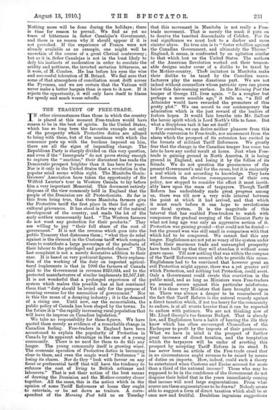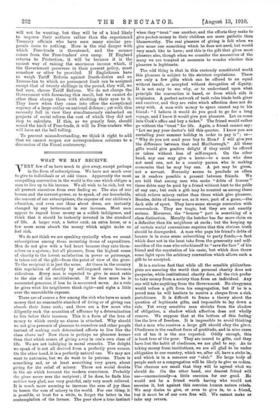THE TRAGEDY OF FREE-TRADE.
IN other circumstances than those in which the country is placed. at this moment Free-traders would have reason to be in the best of spirits. In the United States, which has so long been the favourite example not only of the prosperity which Protective duties are alleged • to bring with them, but of the meekness with which the consumer puts up with the burdens imposed on him, there are all the signs of impending change. The Republican Party is sharply divided on this very question, . and even if the ‘; Insurgents " do not prove strong enough to capture the "machine," their discontent has made the Democratic prospect brighter than it has been for years. Nor is it only in the United States that a revolution in the • popular mind seems within sight. The Manitoba Grain- Growers' Association have taken the opportunity of Sir Wilfrid Laurier's tour in Western Canada to lay before him a very important Memorial. This document entirely disposes of the view commonly held in England that the people of the Dominion are all Protectionists. So far is , this from being true, that these Manitoba farmers give the Protective tariff the first place in their list of agri- cultural grievances. It has stood in the way of the natural development of the country, and made the lot of the early settlers unnecessarily hard. "The Western farmers do not want any protection for their products." They are willing to pay "their full share of the cost of government." It is not the revenue which goes into the . public Treasury that distresses them ; "what they do rebel against is the element in the Customs tariff which compels . them to contribute a large percentage of the products of their labour to the privileged and protected classes." This last complaint is not a merely decorative addition to their case. It is based on very pertinent figures. Their explana- - tiou of the working of the duty on imported agricul- tural implements is that in 1906 the farmers of Canada paid to the Government in revenue $323,024, and to the protected manufacturers of similar implements $2,567,149. It is not wonderful that a prolonged experience of the system which makes this possible has at last convinced them that "duty should be levied only for the purpose of creating revenue for the necessities of government.' Nor is this the moan of a decaying industry ; it is the demand of a rising one. Until now, say the memorialists, the public policy of Canada has been shaped by the towns. In the future it is "the rapidly increasing rural population that will leave its impress on Canadian legislation." • We take no responsibility for these figures. We have • quoted them merely as evidence of a remarkable change in Canadian feeling. Free-traders in England have been accustomed, to explain the popularity of Protection in Canada by its apparent advantage in the case of a young community. There is no need for them to do this any longer. The young community itself is growine. wiser. The economic operation of Protective duties is becoming clear to them, and even the magic word " Preference " is - losing its charm. Nor do they "look with favour on any fiscal orpreferential tariff that will have the tendency to enhance the cost of living to British artizans and labourers." That is not their notion of the best means - of drawing the Dominion and the Mother-country closer together. All the same, this is the notion which in the . opinion of some Tariff Reformers • at home they ought - to entertain, or be set down as traitors. A corre- spondent of the Morning Post told us on Tuesday that this movement in Manitoba is not really a Free- trade movement. That is merely the mask it puts on to deceive the besotted descendants of Cobden. For its real significance we must look to a darker and more sinister abyss. Its true aim is to "foster rebellion against the Canadian Government, and ultimately the Throne." England, it seems, is confronted by an agitation similar to that which lost us the United States. The authors of the American Revolution worked out their treason- able designs under cover of a dislike to be taxed by the Mother-country. Their imitators in Manitoba make their dislike to be taxed by the Canadian manu- facturers play the same disastrous part. We are not indeed without counsellors whose patriotic eyes can pierce below this fair-seeming surface. In the Morning Post the temper of George III. lives again. "In a rougher but perhaps a more sensible age," it tells us, "a Bill of Attainder would have rewarded the promoters of this pretty plot." We can accord to our contemporary the admiration which is the just reward of the leaders of forlorn hopes. It would fain breathe into Mr. Balfour the heroic spirit which is Lord North's title to fame. But what a Sisyphean task it has set itself ! For ourselves, we can derive neither pleasure from this notable conversion to Free-trade, nor amusement from the alarm which the prospect of its extension has excited in the breasts of militant Tariff Reformers. We greatly fear that the change in the Canadian temper has come too late to have any useful result at home. Just when Free- trade is gaining ground in North America, it is losing ground in England, and losing it by the follies of its friends. We do not question the genuineness of the present Government's zeal for the cause, but it is eminently a zeal which is not according to knowledge. They have not foreseen the obvious consequences of their own policy, nor stopped to consider the effect it must inevit- ably have upon the mass of taxpayers. Though Tariff Reform has undoubtedly made great progress among us, there was till now a very wide interval between the point at which it had arrived, and that which it must reach before it can hope to revolutionise our fiscal system. It is the magnitude of this interval that has enabled Free-traders to watch with composure the gradual merging of the Unionist Party in what not long ago was only an aggressive section of it. Protection was gaining ground—that could not be denied— but the ground won was still small in comparison with that which had to be conquered. We cannot feel this any longer. Englishmen are not yet so weary of the system under which their enormous trade and unexampled prosperity have been built up that they will abandon it without some grave cause. Till now nothing that was within the compass of the Tariff Reformers seemed able to provide this cause. Englishmen had to be convinced that however great an evil Protection might appear, there was a yet greater evil which Protection, and nothing but Protection, could avert. Only a Government could create this conviction in the public mind, and so long as Ministers were Free-traders we seemed secure against this particular misfortune. Yet it is these very Ministers that have brought it upon us. There was always a danger to be remembered in the fact that Tariff Reform is the natural remedy against a direct taxation which, if not too heavy for the community . to endure, is at all events heavier than it can be expected to endure with patience. We are not thinking now of Mr. Lloyd George's too famous Budget. That is already law, and Englishmen have a habit of bearing the ills they know which has often encouraged Chancellors of the Exchequer to profit by the imposts of their predecessors. What we have in mind is the prospect of further great increases of direct taxation, and the temptation which the taxpayers will be under of averting this prospect by accepting Tariff Reform in its stead. It has never been an article of the Free .ti•ade creed that in no circumstances ought revenue to be raised by means of duties on imports. How, indeed, could such a theory be entertained when Customs and Excise account for more than a third of the national income? Those who may be supposed to be in the confidence of the Government do not disguise their belief that in the years immediately coming that income will need large augmentations. From what source are these augmentations to be drawn? Nobody seems able to suggest a form of direct taxation which shall be at once new and fruitful. Doubtless ingenious suggestions will not be wanting, but they will be of a kind likely to impress their authors rather than the experienced Treasury officials who have seen many similar pro- posals come to nothing. Here is the real danger with which Free-trade is threatened, and the menace comes from the Free-traders' own camp. If England returns to Protection, it will be because it is the easiest way of raising the enormous income which, if the Government persevere in their present policy, must somehow or other be provided. If Englishmen have to weigh Tariff Reform against Death-duties and an Income-tax to which no permanent limit can be assigned except that of twenty shillings in the pound, they will, we feel sure, choose Tariff Reform. We do not charge the Government with foreseeing this result, but we cannot do other than charge them with shutting their eyes to it. They knew when they came into office the exceptional urgency of a large outlay on national defence ; yet with this necessity full in view they simultaneously embarked on projects of social reform the cost of which they did not stop to calculate. If this, as we greatly fear, should sound the knell of Free-trade, it will be Free-traders who will have set the bell tolling.
To prevent misunderstanding, we think it right to add that we cannot reopen our correspondence columns to a discussion of the Fiscal controversy.







































 Previous page
Previous page